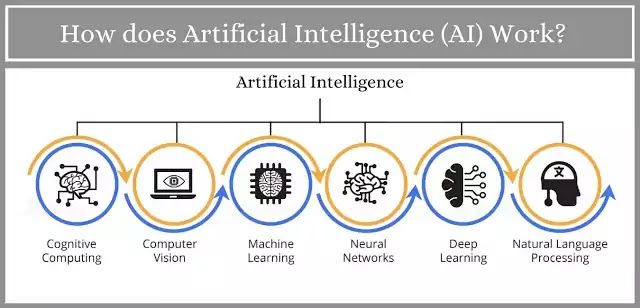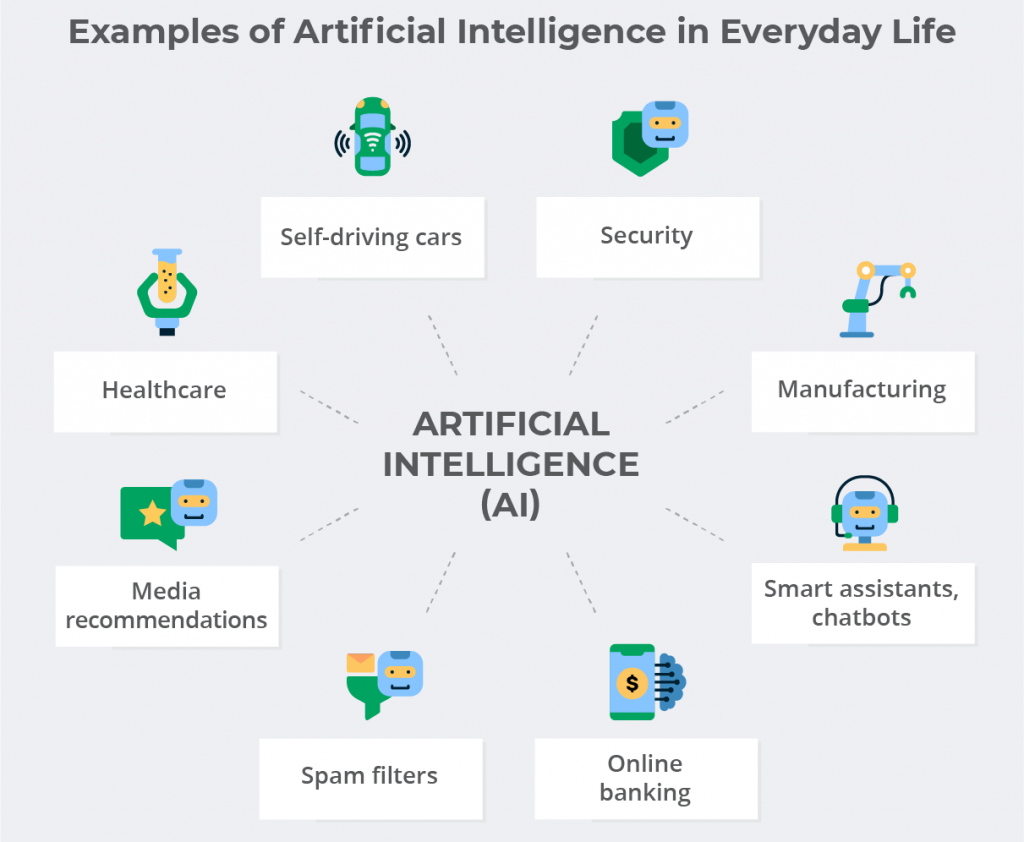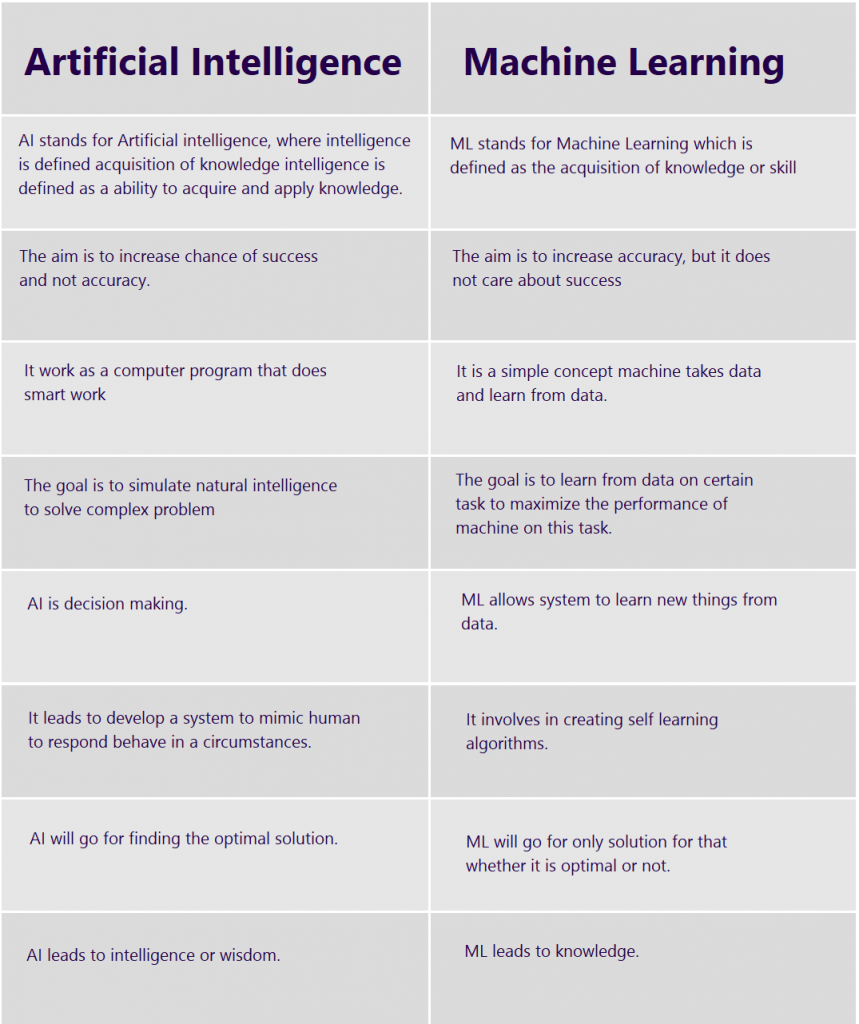Artificial Intelligence (AI) is revolutionizing industries worldwide. From automating routine tasks to enabling self-driving cars and intelligent healthcare diagnostics, AI is reshaping the future of work. For college students and…

AI in 2026: Skills & Career Choices That Will Matter
In today’s rapidly evolving technological landscape, artificial intelligence (AI) stands at the forefront of innovation, reshaping industries and transforming the way we live and work. As college students and recent graduates, understanding AI is crucial for navigating the job market and preparing for the future.
This comprehensive guide will explore the fundamentals of AI, its various types, and applications, and the exciting career opportunities it presents.
What is Artificial Intelligence [AI]?
Artificial intelligence refers to the development of computer systems capable of performing tasks that typically require human intelligence. These tasks include visual perception, speech recognition, decision-making, and language translation. AI systems are designed to learn from experience, adapt to new inputs, and perform human-like tasks with increasing efficiency and accuracy.
The concept of AI has been around for decades, but recent advancements in computing power, data availability, and algorithm development have propelled it into the spotlight. Today, AI is no longer confined to science fiction; it’s a reality that touches nearly every aspect of our lives, from smartphones to healthcare systems.
Types of Artificial Intelligence
AI can be categorized into several types based on its capabilities and similarity to human intelligence:
- Narrow AI (Weak AI): This type of AI is designed to perform specific tasks within a limited domain. Examples include virtual assistants like Siri or Alexa, recommendation systems on streaming platforms, and spam filters in email applications.
- General AI (Strong AI): This hypothetical form of AI would possess human-like intelligence and the ability to solve any intellectual task that a human can. While this level of AI doesn’t exist yet, it remains a goal for many researchers in the field.
- Artificial Superintelligence: This theoretical type of AI would surpass human intelligence and capabilities in virtually every field, including scientific creativity, general wisdom, and social skills.
How Does AI Work?
Understanding how AI works is crucial for grasping its potential and limitations. At its core, AI systems rely on several key components and processes:
- Machine Learning: This subset of AI focuses on developing algorithms that allow computers to learn from and make decisions or predictions based on data. There are three main types of machine learning:
- Supervised Learning: The algorithm learns from labeled training data to make predictions or decisions.
- Unsupervised Learning: The algorithm identifies patterns in unlabeled data.
- Reinforcement Learning: The algorithm learns through interaction with its environment, receiving feedback as rewards or penalties.

- Deep Learning: A subset of machine learning inspired by the structure and function of the human brain. Deep learning uses artificial neural networks with multiple layers (hence “deep”) to analyze various data factors.
- Natural Language Processing (NLP): This branch of AI focuses on the interaction between computers and human language, enabling machines to understand, interpret, and generate human language.
- Computer Vision: This field deals with how computers gain high-level understanding from digital images or videos, allowing machines to identify and process objects like human vision.
- Robotics: The branch of AI that deals with the design, construction, operation, and use of robots, combining AI algorithms with physical machines to perform tasks in the real world.
Artificial Intelligence Examples
AI is already prevalent in our daily lives, often in ways we might not even realize. Here are some common examples:

- Virtual Assistants: Siri, Google Assistant, and Alexa use natural language processing and machine learning to understand and respond to user queries.
- Recommendation Systems: Platforms like Netflix, Amazon, and Spotify use AI to analyze user behavior and preferences to suggest content or products.
- Autonomous Vehicles: Self-driving cars use a combination of computer vision, sensor fusion, and deep learning to navigate roads and make decisions.
- Facial Recognition: Used in security systems and smartphone unlocking features, facial recognition employs computer vision and deep learning algorithms.
- Fraud Detection: Banks and financial institutions use AI to detect unusual patterns in transactions that may indicate fraudulent activity.
- Healthcare Diagnostics: AI systems are being developed to analyze medical images and assist in diagnosing diseases with high accuracy.
Artificial Intelligence Training Models
To create effective AI systems, researchers and developers use various training models and techniques:
- Supervised Learning Models: These include linear regression, logistic regression, decision trees, and support vector machines. They are trained on labeled data to make predictions or classifications.
- Unsupervised Learning Models: Clustering algorithms like K-means and hierarchical clustering, as well as dimensionality reduction techniques like Principal Component Analysis (PCA), are used to find patterns in unlabeled data.
- Deep Learning Models: Convolutional Neural Networks (CNNs) for image processing, Recurrent Neural Networks (RNNs) for sequential data, and Transformer models for natural language processing are examples of deep learning architectures.
- Reinforcement Learning Models: Q-learning, Deep Q Networks (DQN), and Policy Gradient methods are used to train AI agents to make decisions in interactive environments.
- Transfer Learning: This technique involves using pre-trained models on new, related tasks, reducing the need for large amounts of labeled data and computational resources.
Applications of AI
The applications of AI span across numerous industries and domains:
- Healthcare: AI is used for disease diagnosis, drug discovery, personalized treatment plans, and robotic surgery assistance.
- Finance: AI powers algorithmic trading, fraud detection, credit scoring, and personalized financial advice.
- Education: Adaptive learning platforms, automated grading systems, and personalized tutoring use AI to enhance the learning experience.
- Transportation: Besides autonomous vehicles, AI is used in traffic management systems, route optimization, and predictive maintenance for vehicles and infrastructure.
- Manufacturing: AI-powered robots and machine vision systems improve production efficiency, quality control, and supply chain management.
- Customer Service: Chatbots and virtual assistants handle customer inquiries, providing 24/7 support and reducing the workload on human agents.
- Entertainment: AI enhances gaming experiences, creates realistic computer-generated imagery (CGI) in films, and powers content recommendation systems.
Use Cases of Artificial Intelligence
Let’s explore some specific use cases that demonstrate the power and versatility of AI:
- Precision Agriculture: AI-powered drones and sensors analyze crop health, soil conditions, and weather patterns to optimize irrigation and fertilizer use, increasing crop yields while reducing resource consumption.
- Language Translation: Neural machine translation systems like Google Translate use advanced AI to provide increasingly accurate translations between hundreds of languages.
- Cybersecurity: AI systems analyze network traffic and user behavior to detect and respond to cyber threats in real time, protecting organizations from sophisticated attacks.
- Drug Discovery: AI accelerates the drug discovery process by analyzing vast databases of chemical compounds and predicting their effectiveness against specific diseases.
- Smart Home Automation: AI-powered systems learn user preferences and patterns to automatically adjust lighting, temperature, and security settings for optimal comfort and energy efficiency.
- Predictive Maintenance: In industries like manufacturing and aviation, AI analyzes sensor data to predict when equipment is likely to fail, allowing for proactive maintenance and reducing downtime.
- Content Creation: AI tools assist in generating written content, creating music, and even producing artwork, opening new possibilities for creative expression.
Augmented Intelligence vs. Artificial Intelligence vs. Machine Learning
While often used interchangeably, these terms have distinct meanings:
- Artificial Intelligence: This is the broadest term, encompassing the entire field of creating intelligent machines that can simulate human thinking capability and behavior.
- Machine Learning: A subset of AI that focuses on the ability of machines to receive data and learn for themselves without being explicitly programmed.
- Augmented Intelligence: Also known as intelligence amplification (IA), this approach focuses on AI’s assistive role, emphasizing that cognitive technology is designed to enhance human intelligence rather than replace it.

The key differences:
- Scope: AI is the overarching concept, while machine learning is a specific approach to achieving AI. Augmented intelligence is a perspective on the application of AI technologies.
- Human Involvement: Augmented intelligence explicitly emphasizes the collaborative nature between humans and AI, while traditional AI concepts may focus more on autonomous systems.
- Learning Process: Machine learning is specifically about algorithms learning from data, while AI and augmented intelligence may involve other techniques beyond just learning from data.
- End Goal: The goal of AI might be seen as creating fully autonomous systems, while augmented intelligence aims to create tools that enhance human capabilities.
Understanding these distinctions is crucial for grasping the nuances of AI technologies and their applications in various fields.
Advantages and Disadvantages of Artificial Intelligence
As with any transformative technology, AI comes with both benefits and potential drawbacks:
Advantages of AI
- Increased Efficiency: AI can perform tasks faster and more accurately than humans, improving productivity across industries.
- 24/7 Availability: AI systems can work continuously without fatigue, providing round-the-clock services in areas like customer support.
- Reduced Human Error: In tasks requiring precision and consistency, AI can significantly reduce errors caused by human factors.
- Enhanced Decision Making: AI can analyze vast amounts of data to provide insights and support better decision-making in various fields.
- Personalization: AI enables highly personalized experiences in areas like education, entertainment, and marketing.
- Automation of Dangerous Tasks: AI-powered robots can perform hazardous jobs, reducing risks to human workers.
- Scientific Advancements: AI accelerates research in fields like medicine, climate science, and space exploration.
Disadvantages of AI
- Job Displacement: As AI automates more tasks, there’s concern about potential job losses in certain industries.
- Privacy Concerns: The vast amount of data required to train AI systems raises questions about data privacy and security.
- Bias and Fairness: AI systems can perpetuate or amplify existing biases if not carefully designed and monitored.
- Lack of Emotional Intelligence: While AI can process information quickly, it lacks the emotional understanding that humans possess.
- Dependence on Technology: Over-reliance on AI systems could lead to a loss of human skills and critical thinking abilities.
- Ethical Concerns: The development of advanced AI raises ethical questions about decision-making, accountability, and the potential for misuse.
- High Costs: Implementing and maintaining advanced AI systems can be expensive, potentially widening the technological divide between organizations and countries.
Careers in AI for College Students
The field of AI offers exciting and lucrative career opportunities for college students and recent graduates. Here are some potential career paths:
- Machine Learning Engineer: Develop and implement machine learning algorithms and systems.
- Data Scientist: Analyze and interpret complex data to inform AI model development and business decisions.
- AI Research Scientist: Conduct research to advance the field of AI, often in academic or industrial research labs.
- Natural Language Processing (NLP) Engineer: Specializes in developing AI systems that can understand and generate human language.
- Computer Vision Engineer: Work on AI systems that can interpret and analyze visual information from the world.
- Robotics Engineer: Design and develop AI-powered robotic systems for various applications.
- AI Ethics Specialist: Address ethical considerations in AI development and deployment.
- AI Product Manager: Oversee the development and launch of AI-powered products and services.
- AI Business Analyst: Bridge the gap between technical AI capabilities and business applications.
- AI Trainer/Instructor: Educate others about AI technologies and applications.
How to Prepare for a Career in AI?
To prepare for these careers, college students should:
- Develop a strong foundation in mathematics, particularly in linear algebra, calculus, and statistics.
- Learn programming languages commonly used in AI, such as Python, R, and Java.
- Gain experience with machine learning frameworks like TensorFlow, PyTorch, and scikit-learn.
- Participate in AI-related projects, internships, and hackathons to build practical skills.
- Stay updated with the latest AI research and developments by reading academic papers and attending conferences.
- Consider pursuing advanced degrees in AI, machine learning, or related fields for research-oriented roles.
- Develop strong problem-solving and critical thinking skills, as AI often involves tackling complex, open-ended challenges.
- Cultivate interdisciplinary knowledge, as AI applications often span multiple domains.
Artificial intelligence is no longer a futuristic concept; it’s a present reality that’s reshaping our world. As college students and recent graduates, understanding AI’s fundamentals, applications, and implications is crucial for navigating the evolving job market and contributing to technological advancements.
FAQs on AI Artificial Intelligence
What is AI (Artificial Intelligence)?
AI, or Artificial Intelligence, refers to the development of computer systems that can perform tasks requiring human intelligence, such as problem-solving and decision-making. AI systems often use machine learning algorithms to learn from data and improve their performance.
What is Artificial Intelligence with examples.
Artificial intelligence is the development of computer systems that can perform tasks typically requiring human intelligence. Examples include:
- Virtual assistants like Siri or Alexa
- Recommendation systems on Netflix or Amazon
- Self-driving cars
- Facial recognition technology
- Chatbots for customer service
- Fraud detection in banking
- Medical diagnosis systems
- Automated content creation tools
AI systems learn from data, adapt to new inputs, and perform human-like tasks with increasing efficiency.
How does Machine Learning differ from Artificial Intelligence?
Machine Learning (ML) is a subset of Artificial Intelligence (AI). While AI is the broader field, ML focuses on developing algorithms that allow computers to learn from data and make predictions or decisions. ML often uses techniques like deep learning and neural networks.
What are some real-world applications of AI?
AI has diverse applications, including virtual assistants (e.g., Siri), recommendation systems (e.g., Netflix), autonomous vehicles, healthcare diagnostics, chatbots, and fraud detection. AI is transforming industries such as healthcare, finance, and retail.
How can I start a career in AI as a fresher?
To kickstart a career in AI as a fresher, you can begin by learning programming languages like Python and studying mathematics and statistics. Take online courses in machine learning, work on personal projects, participate in competitions, and seek internships or entry-level positions in AI-related roles.
What are the key skills needed for a career in AI?
Key skills for an AI career include programming (Python, R), machine learning, data analysis, statistics, deep learning, natural language processing (NLP), computer vision, and problem-solving. Soft skills like critical thinking and communication are also valuable.
Where can I find AI job opportunities for freshers?
You can find AI job opportunities for freshers on job portals like Firstnaukri, LinkedIn, and Naukri. Additionally, consider networking with professionals in AI through conferences, webinars, and meetups to discover job openings and gain insights into the field.
Latest Posts
How to Write a Leave Letter (Format & Examples)
In today’s fast-paced academic and professional environments, there may come a time when you need to take a leave of absence. Writing a leave letter is an essential skill that…
How to Write a Job Application Letter (With Samples)
When it comes to applying for your first job, making a great first impression is crucial. As a recent graduate, you might feel a little intimidated by the idea of…
Data Science vs Data Analytics – Everything You Need to Know!
In today’s digital economy, Data Science and Data Analytics have become some of the most sought-after career paths for students and freshers, especially in India. With businesses increasingly relying on…
How to Land Your Dream Job: Job Search Guide for Beginners
In today’s competitive job market, securing your dream job requires more than just a polished resume and a strong cover letter. It demands a strategic approach and a deep understanding…
Popular Posts
100+ Quantitative Aptitude Questions for Placement with Answers
Quantitative aptitude questions play a crucial role in campus placements, competitive exams, and entry-level job interviews. Whether you are preparing for your first job interview, an aptitude test for placement,…
How to Write Mail for Job Application – Explained
A job application email is a professional email that you send to a potential employer to express your interest in a job opening. It is typically accompanied by your resume…
How to Start an AI Career in India: Skills and Future of Work
Artificial Intelligence (AI) is revolutionizing industries worldwide. From automating routine tasks to enabling self-driving cars and intelligent healthcare diagnostics, AI is reshaping the future of work. For college students and…
Google Internship 2026 for Freshers: All You Need to Know
In the competitive landscape of technology careers, a Google internship stands out as a golden opportunity for aspiring professionals. Whether a college student or a recent graduate, securing an internship…
How to Write a Job Application Letter (With Samples)
When it comes to applying for your first job, making a great first impression is crucial. As a recent graduate, you might feel a little intimidated by the idea of…
